Russia Says Joint Naval Drills With Iran, China Planned
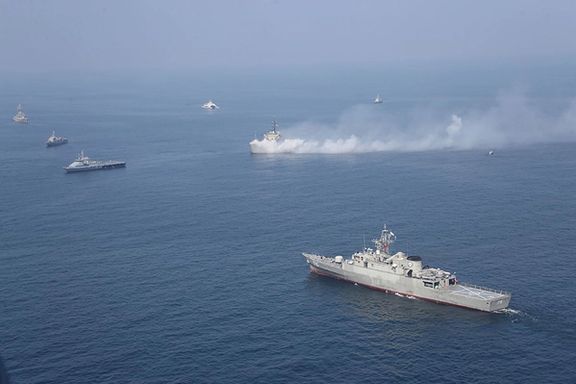
The Russian Pacific Fleet says it will take part in joint naval war games with Iran and China in without announcing the exact date and location for the drills.

The Russian Pacific Fleet says it will take part in joint naval war games with Iran and China in without announcing the exact date and location for the drills.
The fleet’s press service said Tuesdaythat a delegation of Navy personnel has traveled to Iran’s southeastern port city of Chabahar for a planning session and preliminary coordination.
A detachment of warships from Russia’s Pacific Fleet, including large sea tanker Boris Butoma and Russian destroyer Admiral Tributs as well as missile cruisers Varyag and Guards Order of the Nakhimov, will join the Iranian and Chinese fleets for the drills.
The unit set out on a voyage from the southern port of Vladivostok in Far East Russia a few days before the 2022 New Year and anchored near Chabahar port on the Sea of Oman earlier in the week.
In August 2020, the Russian ambassador in Tehran, Levan Dzhagaryan, had said that joint naval exercisesin the Persian Gulf would take place at the end of 2021 or early 2022.
He had also said that the main focus of the exercises was to ensure safe navigation in international shipping lanes and anti-piracy operations.
Announcing the formation of Marine Security Belt -- also known as the portmanteau CHIRU -- China, Russia and Iran held their first joint naval drills in the region in the very last days of 2019.

Lebanese newspaper al-Akhbar says the United States has sought to have a communication channel with the Iran-backed Hezbollah group in Lebanon.
According to al-Akhbar on Tuesday, the US government has delivered a message to Hezbollah via mediators, asking for a way to discuss various issues regarding Lebanon.
The report said Hezbollah informed the mediators that they reject any form of communication with the Americans.
Hashim Safi Al Din, a senior Hezbollah official -- and a maternal cousin of Hezbollah secretary general Hassan Nasrallah – has reportedly confirmed the claim, saying that Americans tried to communicate with the Hezbollah leadership.
He said that a mediator carried the message, expressing Washington’s readiness to negotiate over any issue, but Hezbollah refusedwithout any discussion whatsoever.
Although such claims may be plausible, they are rarely officially reported and cannot be independently verified.
Recently, Israeli media reported that a deal was secretly signed with Beirut to supply natural gas to Lebanon through Jordan and Syria, adding that the agreement was brokered by Washington’s special envoy and coordinator for international energy affairs Amos Hochstein and also coordinated with Russian President Vladimir Putin.
The Lebanese government and the US state department later denied the existence of such an agreement.
Lebanon has experienced an unprecedented economic breakdown since 2019, and some blame Hezbollah for the country’s isolation.
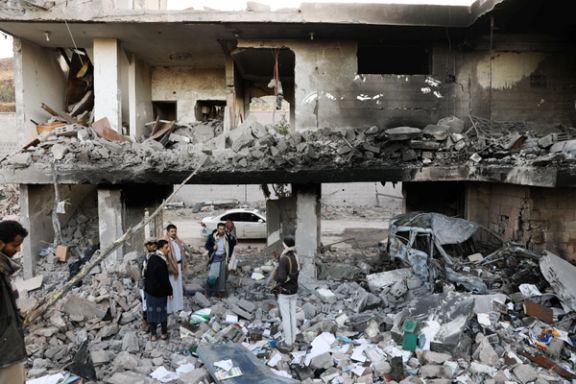
An air strike killed about 14 people in a building in Yemen's capital Sanaa, residents said on Tuesday, in attacks by the Saudi-led coalition fighting the Houthi group.
The alliance strikes on Houthi-held Sanaa followed an attack claimed by the Iran-aligned Houthis on Monday on coalition partner the United Arab Emirates, in Abu Dhabi, in which three people were killed.
The coalition also said it intercepted eight drones launched toward Saudi Arabia on Monday.
Early on Tuesday, the coalition said it had begun air strikes against strongholds and camps in Sanaa belonging to the Houthi group, Saudi state media said.
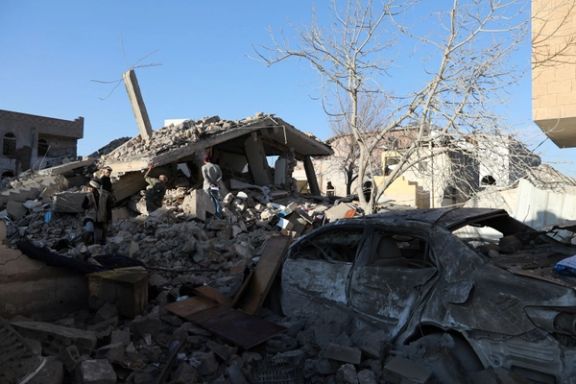
The strikes appeared to be the deadliest since 2019 on Sanaa.
The strike that killed about 14 people, according to initial estimates, was on the home of a Houthi military official.
It killed him, his wife, his 25-year-old son, other family members and some unidentified people, a medical source and residents told Reuters.
The UAE has armed and trained Yemeni forces that recently joined fighting against the Houthis in Yemen's energy-producing regions of Shabwa and Marib.
Monday's Houthi-claimed attack on two sites in the UAE set off explosions in fuel trucks, killed three people and ignited a blaze near Abu Dhabi airport.
In response, the UAE said it reserved the right to respond to "terrorist attacks and criminal escalation".
Reporting by Reuters

As the United Arab Emirates vowed punishment for the Houthi missile and drone strike on key targets in the country, the United States also condemned the attack.
"The UAE condemns this terrorist attack by the Houthi militia on areas and civilian facilities on Emirati soil...(It) will not go unpunished," its foreign ministry said. "The UAE reserves the right to respond to these terrorist attacks and criminal escalation."
Iran-backed Houthi rebels Monday targeted a key oil facility in Abu Dhabi and the UAE capital's international airport with explosive-laden drones launched from Sana'a airport, the Saudi-led Coalition that backs Yemen's internationally recognized government said Monday.
The UAE, a member of the coalition, has armed and trained local Yemeni forces that recently joined fighting against the Houthis in Yemen's energy-producing Shabwa and Marib regions.
"With (nuclear) negotiators running out of time, the risk of a deterioration in the region's security climate is rising," said Torbjorn Soltvedt, principal MENA analyst at risk intelligence company Verisk Maplecroft.
US Secretary of State Antony Blinken, in a phone call with his Emirati counterpart, condemned the attack, the UAE state news agency reported.
A statement by the State Department said, "The United States strongly condemns the terrorist attacks in Abu Dhabi today, which struck civilian sites including Abu Dhabi’s international airport, killing and wounding innocent civilians." The US reiterated its "unwavering commitment to the security of the UAE"
White House national security adviser Jake Sullivan said Washington would work to hold the Houthis accountable.
The Biden Administration lifted the US terror designation imposed on Houthis almost a year ago, possibly to encourage a peace arrangement, but the Iran-backed group continued attacks against Saudi Arabia and rejected proposals for a ceasefire.
The UAE also hosts the US Navy and other forces. The Houthi threat that all UAE territory is within reach of its weapons could also be seen as a threat against the presence of the US military.
Houthi military spokesman Yahya Sarea said the group fired five ballistic missiles and "a large number" of drones at Dubai and Abu Dhabi airports, an oil refinery in Musaffah and several "sensitive" sites in the UAE.
The Saudi-led alliance carried out air strikes on Yemen's Houthi-held capital Sanaa, Reuters witnesses said, following the strike on the UAE and after the coalition intercepted eight drones launched toward Saudi Arabia on Monday.
United Nations Secretary-General Antonio Guterres condemned the attack on the UAE and urged "all parties to exercise maximum restraint and prevent any escalation", his spokesperson said.
French Foreign Minister Jean-Yves Le Drian said the attack threatened regional stability.
Riyadh and Abu Dhabi had moved to engage directly with Iran in recent months to avoid any wider conflict that could disrupt the region’s economy. The Yemen war is widely seen as a proxy war between Sunni Muslim Saudi Arabia and Shi'ite Iran.
The Houthi strike could derail UAE and wider Gulf dialogue with Iran, said UAE political analyst Abdulkhaleq Abdulla.
"The UAE is not going to take this very lightly," he said.
With reporting by Reuters
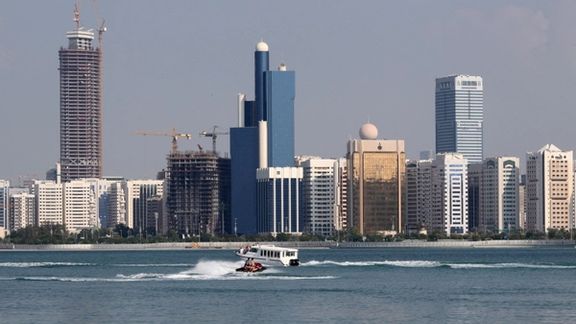
The Houthi information minister told an Iranian news agency the group’s drone attack on Abu Dhabi was a message that the UAE is within reach of Yemeni rebels.
Zeifollah al-Shami told the Revolutionary Guards (IRGC) affiliated Tasnim news agency in an interview after Monday's attack that the most important message of the Houthis operation was telling the United Arab Emirates that there would be retaliation if the UAE continued to attack Houthi forces.
Yemen's Iran-backed Houthi rebels Monday targeted a key oil facility in Abu Dhabi and the UAE capital's international airport with explosive-laden drones launched from Sana'a airport, the Saudi-led Coalition that backs Yemen's internationally recognized government said Monday.
The Houthi drone strike coming amid indirect talks between the United States and Iran to revive the 2015 nuclear talks might add another negative factor in to the complicated process. Saudi Arabia, UAE, Bahrain and Israel say that Iran’s support for militant groups is a serious threat to regional stability and an agreement with Iran should also tackle this issue in addition to Tehran’s nuclear program.
The UAE also hosts the US Navy and other forces. The Houthi threat could also be seen as a threat against the presence of the US military.
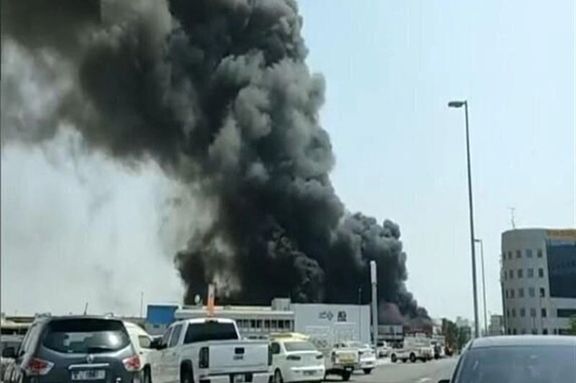
According to the Abu Dhabi police, three fuel tanker trucks exploded in the industrial Musaffah area near oil storage facilities firm Abu Dhabi National Oil Company, adding that a separate "minor" fire broke out at a construction site of the emirate’s main airport. Houthis’ military spokesman claimed responsibility for the two incidents and said they had launched a military operation "deep in the UAE" and would announce details in coming hours.
"The attack by the [Houthi] Yemeni armed forces against the UAE was part of a legal and legitimate response that was carried out in retaliation for the escalation of war by the UAE and its continuous military actions against the people of Yemen," he told Tasnim.
In its report on today's attack, another IRGC-affiliated news agency, Fars, said it was the Houthis' "concrete warning to Abu Dhabi for continuing its aggression in Yemen despite [earlier] warnings."
The attacks on Abud Dhabi Monday involved 20 drones and 10 ballistic missiles, Fars said in a report entitled "The Reason for the Yemeni Attack on Abu Dhabi Today", while calling it the "biggest strike on the UAE in the country's 50-year history."
The UAE has substantially reduced its involvement in Yemen and the Houthi claim os Emirati aggression seems overblown.
Iran-backed Houthi group conducts regular cross-border missile and drone attacks against targets in Saudi Arabia and the Saudi-led coalition has retaliated with air strikes inside Yemen. Houthi claims of attacks inside the UAE, however, have been rare and mostly denied by Abu Dhabi.
Earlier this month the Houthis hijacked a UAE-flagged cargo vessel heading to the Saudi port of Jizan, just north of Yemen. The Houthis claimed the vessel was a “military cargo ship” carrying equipment into Yemen’s territorial waters to engage in “hostile acts”.
In 2019 the UAE, a member of the Saudi-led coalition that has been fighting Iran-backed Houthi forces for over seven years, scaled down its military presence in Yemen amid heightened regional tensions with Iran.
Iran and Saudi Arabia held talks last year with Iraqi mediation to mend their broken diplomatic relations. Iran and the UAE have also been moving toward a reproachment recently after years of tensions in their relations.
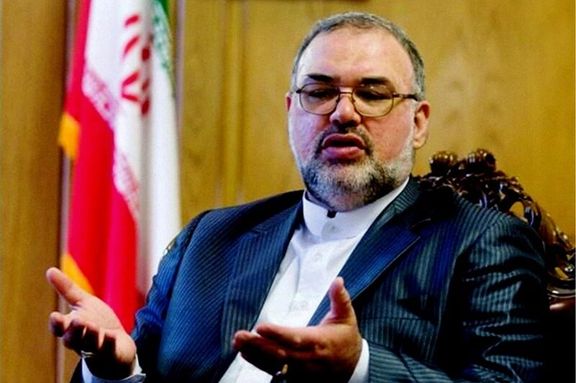
Iran’s former ambassador to Russia says increasing banking cooperation between Tehran and Moscow can be used to circumvent United States’ sanctions.
Mahmoud-Reza Sajjadi said in an interview with IRNA on Monday that Russia can be a good source to import services and commodities that are difficult to procure from other countries due to Washington’s sanctions regime.
Iran and Russia are reportedly mulling the idea of linking their banking networks and doing their transactions in their local currencies to reduce their dependence on the US dollar.
Sajjadi added that Iran’s relations with Russia is not limited to trade and agriculture, saying that the two countries have a history of successful military cooperation, particularly in Syria.
He described Russia as an important strategic partner and said the proposed 20-year agreement with Moscow has a lot of security and political benefits for Iran.
His remarks came as many Iranians have been expressing resentment over the proposed deal with Russia, saying it is a sell-out, although Iran has not revealed any details about the possible agreement.
Upon an invitation by Russian President Vladimir Putin, President Ebrahim Raisi will pay an official state visit to Russia in a few days, but Iranian officials say signing the 20-year roadmap is not on the agenda of his visit asRussia has so far held back from finalizing the deal.